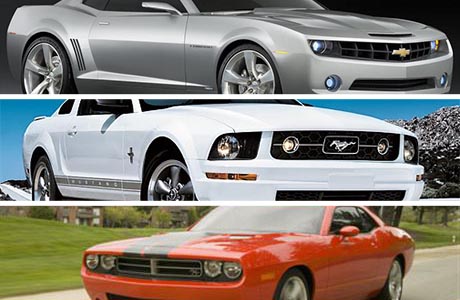Bailing them out...again
After the Big Three automakers received a $25 billion bailout in September, GM and Ford are now coming back to the federal trough to ask for another $50 billion. That is more money than the government spends on the national food stamp program.
It's not surprising that a welfare state as massive as ours spends more money helping the rich than it does the poor. In fact, according to Dr. James Gwartney, an economics professor at Florida State University, only 20 percent of wealth redistribution programs allocate funds to the poor.
The $50 billion bailout is supposed to stop GM and Ford from going bankrupt. Going bankrupt, the companies argue, means some autoworkers will lose their jobs. In total, GM employs 266,000 people and Ford employs about 246,000. So if we assumed bankruptcy means they shut their doors forever and lay off every single employee, the proposed bailout costs $97,000 per employee (and that's excluding the original $25 billion from a month ago).
Even without a bailout, it's unlikely GM or Ford would lay off every employee – which means the actual cost of "saving jobs" will be much higher than $100,000 per position. How many jobs the bailout will save for the moment is, of course, completely unknown. Since the September bailout, GM has already laid off about 4,800 workers (we don't know how many kept their jobs because of the bailout).
So who really gets the bailout money? Wealthy investors, related firms and GM executives – the very people who claim the bailout will be used to preserve jobs and help the less fortunate autoworkers.

What would happen if GM, Ford or Chrysler closed their doors forever? Would automobiles nationwide cease to work? Would Honda, Toyota, Lexus, BMW, Nissan, Kia or Hyundai – all of whom manufacture American cars in America - be unable to fulfill the automotive needs of Americans? Why not let the carmakers go through reorganization under the bankruptcy laws? Such reorganization, say many informed observers, is the real solution.
Governor Jennifer Granholm (D) of Michigan claims the automotive industry is essential to national security. Really? American automakers have, repeatedly, been technologically behind Japanese car manufacturers. By the time Honda was putting out computer-controlled variable valve timing motors in its sporty cars, Chevrolet was still pumping out the old iron block pushrod V-8 as the gold standard of American technological progress more than a decade later.
These kinds of national security arguments are ridiculous. Similar bogus reasoning allowed the famous mohair subsidy (goat wool) to exist for more than 50 years, long after the U.S. military was using synthetic fibers for military uniforms. Yet subsidizing mohair was still a "national security issue." Maybe we feared the goats falling into enemy hands.
Wal-Mart going under would have a bigger impact on our economy than the Big Three shutting down forever. After all, Wal-Mart employs more than twice as many people as GM, Ford and Chrysler combined. Is Wal-Mart a national security issue, too? What about K-Mart or Target or Best Buy or PetSmart?
GM's problems reflect its own bad decisions and those by meddling politicians. The company kept offering gas-guzzling cars during a time when gas prices were pushing upward worldwide. It regularly took the easy but irresponsible way out in its labor negotiations, granting unions exceedingly generous benefits – like agreeing to continue paying laid-off workers until they find new jobs. The meddling politicians, for example, imposed C.A.F.E standards, where fleet fuel mileage requirements imposed compliance costs of roughly $50 billion.
It is no surprise that such a combination of bad management, overly generous benefits for workers and burdensome federal regulations has eventually caught up with the auto giants. Another bailout will only encourage more reckless behavior by the Big Three and its unions – ensuring that we will be bailing them all out again for years to come.





